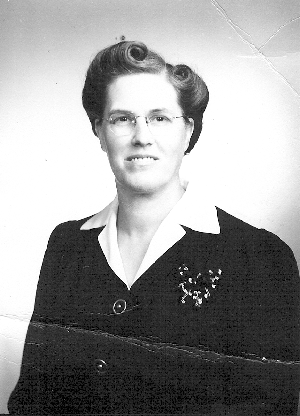Emily Ruth Bradley Smith
Born: 12 October 1895 in Larkinburg, Kansas
Mother: Blanche Isabelle Hudgens Bradley
Father: John Thomas Bradley
Baptized: 1907
Married: 15 Sept. 1914 to Bert Amos Smith
Children: Virginia, Blanche, Glen, Madge
Occupation: Store Clerk/Homemaker
Died: 1 December 1996 in Burke, Virginia
Buried: 4 December 1996 in Fort Lincoln Cemetery, Washington, D.C.
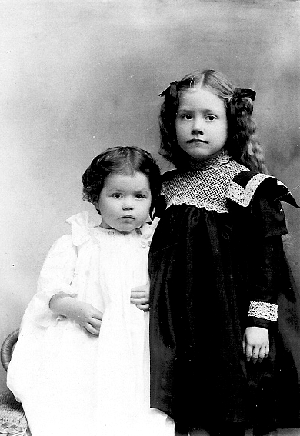
Edith and RuthClick here for a trip to Lookout Mountain in the Rocky Mountains
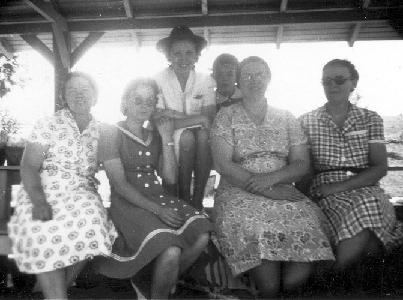
Cousins: (front row) Wilma Crouch, Isabel Earl, Ruth Smith, Leita Peters
(back) Barbara anad Suzanne
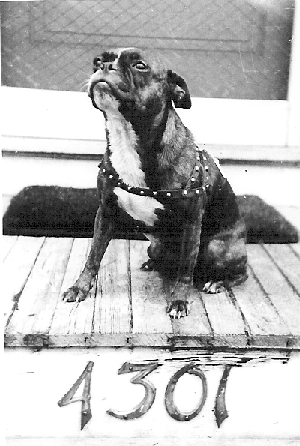
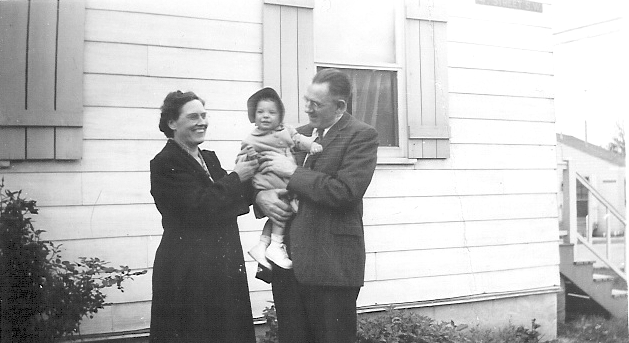
Ruth and Bert with grand-daughter Carolyn Ruth Davis
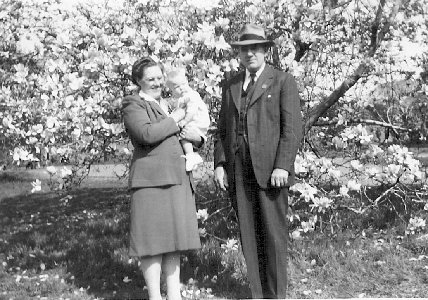
Ruth and Bert with grandson Duane Davis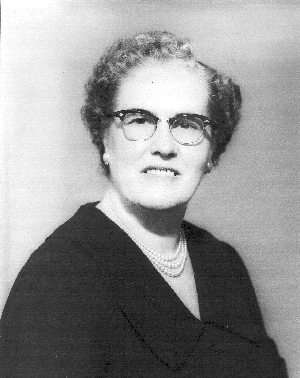
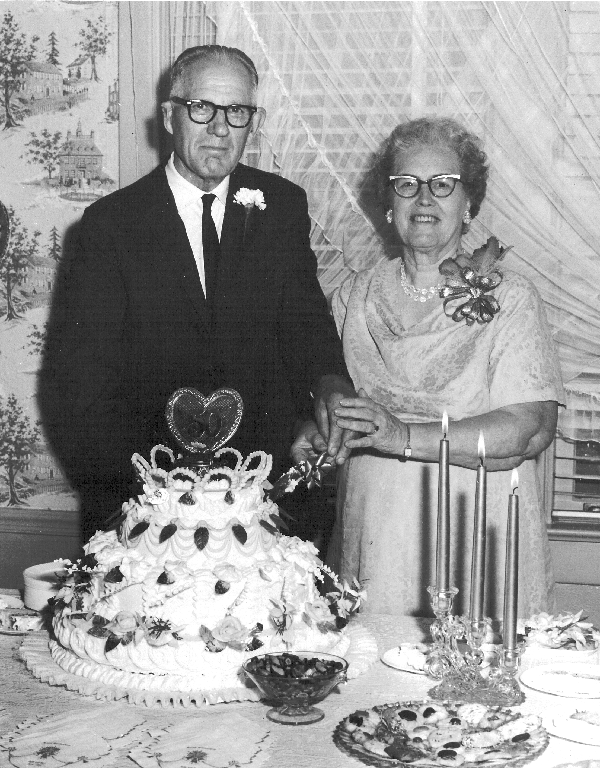
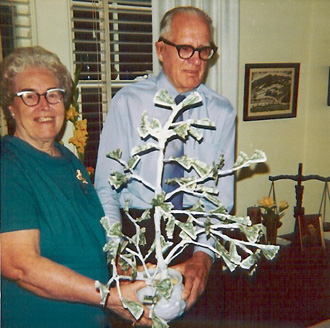
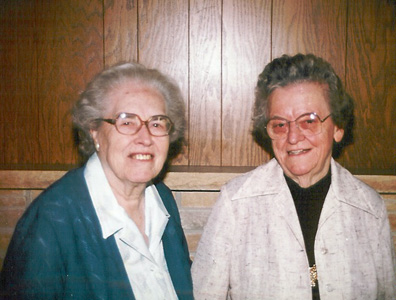
Ruth and Ethel

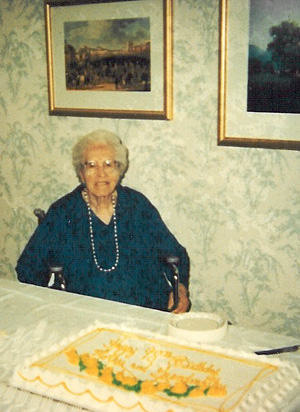

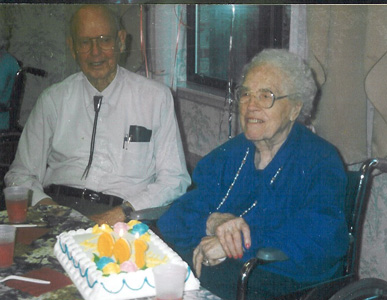
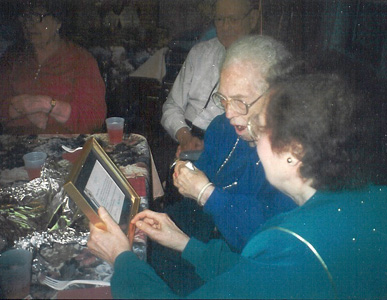
"The President ! ... of the United States?"Horse-N-Buggy Days
An Autobiography by Ruth SmithPREFACE
During a telephone conversation with Mother last spring, she mentioned that Cindy had asked her to write an article for school, describing her school days when she was young. She enjoyed writing it and that gave her the idea for "Her Life Story". We had already made plans for her to visit us for a month this summer; so she asked if I would type it at that time. She wanted it to be a complete surprise. I was really excited about the project and delighted to have a part in it. What a great gift it would be for all the Family!
When Mother arrived, she had much of her story written. Then together we had many conferences while preparing it for the final form. She would recall incidents which she thought should be added, and I would mention others which seemed important to me. We wept tears over the sad events and laughed at the humorous ones. Those hours spent together will always be very precious to?me. Hearing first hand the details about those interesting happenings throughout her long life has been a real privilege.
From a photograph of the old schoolhouse and a "horse and buggy" picture from a magazine, Dan designed the cover. Ron was the photographer and took her picture when he, Becky and Curtis visited Mother in May. Herbert was our technical consultant.
Am sure all of you join me in thanking Mother for sharing "Her Life Story" with us. She spent a great deal of time and many sleepless nights getting her thoughts together and then writing them down. Her remarkable memory is certainly one of her many wonderful traits.
Some of you will recall that Mother and her dear friend, Flora Smith, often would discuss a family incident that had taken place. Then they would make this comment, "Well, that is another page for the book." HERE IS THAT BOOK. It has been a labor of love.
Lovingly,

September 1, 1981
My mother's name was Blanche Isabel Hudgens. Isabel was her grandmother's name on her mother's side of the family. The family name was Perrin and they all lived in St. Louis, Missouri, and Alton, Illinois. They came from England. In going through DAR records in Washington, D.C. I found where many Perrins came from England, but not knowing given names could not trace the history. I'm always so sorry I didn't ask more questions when the older family ones were living.
Grandpa and Grandma Hudgens, John & Sarah, lived in Alton, Illinois. Mama had two brothers, Uncle Ray and Uncle Harry. Uncle Harry never married, but Uncle Ray married and had two children, Helen and Warren. They came to Kansas to visit us often and what good times we had. Helen later lived in Norman, Oklahoma.
In 1917 Helen visited us in Kansas and she and I went to Alton on the train to visit Grandma and Grandpa. Virginia was nine months old. What a good time we had. We took her every place with us. Of course, they were so proud of their first great granddaughter, just as we all are of all of our grandchildren. One weekend Helen and I went to St. Louis to visit Aunt Lizzie, Grandma's sister. How much we enjoyed it. She was really English, wore a white cap on her head and food and tea served just exactly right. We came back on a paddle boat up the Mississippi River. It was quite an interesting trip. We would stand outside where we could watch the paddles churning. Grandma thought I should take a boat ride for no chance of that in dry Kansas. I was gone three weeks and was always so happy I had that trip for wasn't long until they moved away from Alton to live with Uncle Ray in Norman, Oklahoma.
Mama, Edith, Harold and I had made a trip there at Christmas time when I was seven years old. I could remember everything about all the places we visited. They looked just like they did then. When we came back there was lots of snow, and Papa met us in Holton in the sleigh with team. When we came in the house, Edith said, "Turn on the light, mama", but we were back to coal oil lamps then. Mama wrote to Grandma about it.
My father's name was John Thomas Bradley. The family came from Upper New York, my grandmother Elizabeth Jane Hollenbeck Bradley of Dutch heritage. The Bradleys also were of English parentage. They came to America settling in Virginia - one branch moving to Kentucky where my great grandfather was born.
Grandma was a wonderful person and used to tell us all about her early life. They raised sheep and when they sheared them they had to clean and wash the wool and spin it into thread for their clothes. She said if she wanted to make a doll dress she had to ravel out thread from something old. Thread was so dear as she always expressed it. Their first home after they were married was a log cabin near the creek. She said every Saturday she would go down there and get sand and scour her floor until she had it so pretty and white.
Later they built a house on the farm they had bought with Grandpa's money he had saved from the money he got from the government while he was in the Civil War. He passed away in 1899, so I don't remember him too well. Grandma lived to be 100 years old.
Papa, as we always called him, was the only one born in the log cabin in Jackson County, Kansas, east of Holton which is the county seat. He had one brother and five sisters. All in the Bradley family are long?lived. Papa was 90 when he died, Uncle Frank 95, Aunt Maude 96, Grace 92, Aunt Ada 78, Nettie 81. Aunt Eva is the only one still living, and she is 98 years old.
Mama and Papa were married in Alton, Illinois, October 3, 1894, at Grandma and Grandpa's home and left for Kansas on the train. They rented a farm south of Holton and that is where I was born October 12, 1895, and Edith in 1897. Soon after that we moved to a farm near Birmingham. That is where I started to school in the fall of 1900. Harold was born on this place in 1900. The fall of 1901 Grandma Bradley and the girls, Aunt Eva, Nettie and Grace moved to Holton. After Grandpa passed away, it was hard for Grandma to keep the farm going.
We moved after school started to Grandma's farm and how well I remember my first day of school there. I didn't know anyone and I was so scared, but a second cousin who knew who I was took me in charge and helped me so much. I was ever grateful to her. We had good years on Grandma's place.
I'll describe our school days as best I can, much different than schools now. We had to walk almost two miles to school, part of it on the railroad track. It was hard especially when it was muddy, for it was on a bottom road as we called it. Kansas roads get pretty bad when it rains. We always had to leave at eight o'clock, carry our lunch in a tin bucket, empty molasses pail generally - no hot lunches then.
Our school house was one room with a hall room on each side, one for boys and one for girls. We hung our coats on nails and our lunch pails we put on a shelf above. School houses were always on one acre of ground that someone donated out of their farm land. There was a fence around it and on three sides a corn field, no trees for shade at all. There was a stile that we had to walk over the fence, three steps on each side and flat boards on top - no gate.
There was a big round bellied stove near the middle of the building for heat and we burned coal, had a coal shed in one corner of the yard. Every boy was so willing to go get a bucket of coal during school time and stay a little longer while he filled a bucket with coal. We had a pump for our water near there too and on a shelf in one corner of the room was a bucket with a dipper for our drinking water. I guess there weren't any germs those days for we didn't have much sickness. I went three years I remember and didn't miss a day.
We had Lyceum one winter and it was so interesting. Papa was chosen President and we were so proud of him. We would have a good program, songs and usually a paper with jokes written about different ones. Dad wrote one paper and he told a story on his brother-in-law. "Did you know what happened to Bill Moore the other day? His new false teeth were hurting and he took them out and put them in his hind pocket of his overalls. When he sat down, they bit him."
We also had debates on different subjects, and they were very good. One was on whether women should vote, and Papa chose his sister, Grace, to be on the debate team. She came down from Holton on the train, and we were so proud of her for she really could talk. Her team won - Women should vote. That was in 1909, I think.
Another entertainment we had was Box Suppers. The girls would fix a supper in a box that she had decorated with crepe paper with her name inside. An auctioneer auctioned them off. The boys bid for them and always hoped to get their girl's box. The money they brought bought supplies for the school.
Papa always took us to Holton when the circus came to town. We went early to see the parade and sometimes we stayed to see the circus. It was a wonderful day for us.
On Saturday we always went to Holton, a distance of about seven miles, first to Grandma's house for dinner and a visit and in the afternoon to town to do our shopping. Papa always gave us a nickel to spend, and how we looked and looked for something to buy. I nearly always chose a cup and saucer. I have some of them yet.
So much for our school life and our entertainment, now I will go back a few years. My brother Perrin was born in 1903 and how much we loved a baby. On October 9, 1906, Wallace was born - another baby to love. Mama and Papa were always so proud of all of us, but Mama didn't get along so well and on October 20 she passed away. How well I remember every instance. She told us all good-bye, told me to take her place at the table where she always sat. What a terrible loss it was, but life had to go on.
Aunt Maude, Papa's sister, had lost her husband in 1904; so Grandma gave her a part of the farm. Neighbors built a house near us for her and her three children, Leita, Roy and Lester who were about our ages. That first winter after Mama died Aunt Maude moved in with us. Papa's sister, Nettie, was teaching a country school near; so she stayed with us too and drove a horse and buggy to her school. We three girls all had long hair (I could sit on mine), and I well remember her combing our hair by lantern light before she went to school. I don't see how Aunt Maude did everything for work was hard on a farm in those days. She was so good and how we all loved her.
Mama had canned so much fruit that year and I remember how I just couldn't eat any of it and wondered why Aunt Maude would open it. Aunt Maude taught me to bake bread and what a time I had. It wasn't always good, and I wished she had never showed me how. Now I love to bake it. Grandma took Wallace, the baby, and kept him until he went to school. He would stay with us through the summer. She reared Wallace as if he were her own and mothered us children - all our aunts did too. How hard it was for every one. Papa was so sad and so lonesome. My heart still aches for him.
In early 1906 Papa & Mama and Papa's brother, Uncle Frank, and Aunt Cora had bought 160 acres of land from our neighbor for $6,000. It was a prairie pasture. Uncle Frank took the west half for $2800 and Papa the east half for $3200 for it had a small house and barn on it. I can remember Papa and Mama planning their new home, so proud to have a place of their own.
In the spring of 1908 Grandma sold the farm where we lived, and we moved on our own place. We had to get settled in a small house, had to walk farther to school, etc. Edith and I were still young. We would get our house work done and then go play in our play house which was in an empty corn crib then. We always had a big garden, a strawberry bed, and everyone had a row of rhubarb and asparagus bed at end of their garden then. We raised chickens and some years turkeys; so there was plenty of work for us.
A little later Edith and I took music lessons. Mama had a lovely organ. Mrs. Dague, our teacher, drove a horse and buggy out from Holton and gave lessons in the country. She always ate dinner at noon at our house. She was a good teacher, and we had a recital every summer. I still have some of the programs.
It was just a mile across the pasture to Uncle Frank's over gates and under fences, but we made the trip many times. How good they were to Edith and me, helped us so much through those formative years when we needed someone to confide in. They had Ethel and Earl, so Ethel, Edith and I were almost like sisters. Edith passed away in 1972, but Ethel lives in Denver and we have frequent telephone conversations talking over old times.
Uncle Frank left 20 acres of his land the original prairie, has never been plowed, still virgin land - only piece of prairie any place around. Always had such pretty flowers on it in the spring. They cut the prairie hay in the fall for winter feed for the horses, no tractors in those days.
In the summer of 1912 the hawks had been getting Aunt Cora's chickens; so over on the prairie they set a trap to try to trap them, had it chained to a heavy piece of a railroad rail. Earl who was 12, went over to see about it, and there was an eagle in the trap. How one happened to be in the West no one knew.
It was so big and strong it was lifting the rail trying to fly away. Earl had a corn knife, a huge sharp knife, and he cut its head off with it and carried the eagle home thinking it was a real big hawk. Aunt Cora sewed its head back on, and we have a picture of us children holding it out. It had a nine foot span. Some man in Holton gave Earl $5.00 for it and had it mounted and it was displayed in his store for a long time. He said he would have paid $25 if the head hadn't been cut off and sewed back on.
We had church also in the school house and Sunday School too which we always attended. Then Grange was organized near us, and we always went there too. It was a very good organization and Papa was active in it. He was Master of the Grange, and I have an excellent paper that he wrote on the history of it. We first met in the school house and later built a Grange Hall. At the County Fair in the fall the Grange entered a float made of fruits and vegetables. Papa worked very hard on it, and we were so proud of it.
I want to tell something about our play houses and how we entertained ourselves. Each one, Leita, Edith and I, for we all played together had a play house under a tree. We used sticks to divide our rooms and we always had our "front room", as the parlor was called then, on the north side of the tree for that was where the green moss was. That was our carpet.
Mama was so good to us, and she would make us doll clothes. The toys were sturdy ones. I remember having such nice iron skillets and little kettles.
Mama had a canary named Dicky and forgot and left him on the porch one night. He took a cold and died. Well, we children made him a soft bed in a cigar box and had a funeral for him every day for a week, I think. Leita was always the preacher. Papa had made us a platform up in the big maple tree and she always stood up there for the sermon. We sang songs and acted like we were crying. Then we would bury him under a tree. He had lots of burials.
We had clay on the hill side near us and we would mold dishes and put them in the cook stove at night when the fire was going out. They would bake and stay whole. Papa wasn't too happy about it when he had to start a fire in the morning with a grate full of clay dishes.
Grandma's farm was divided with a creek and a railroad, called L.K.& W., ran from Leavenworth to Western Kansas. It had two passenger trains a day morning and evening and lots of freight trains.
Bevard Station, very near the school house, where we used to flag the train was only a box car by the track with benches in it. When we wanted to ride the train we waved a paper to flag the train for it to stop or at night we waved a lantern or a lighted newspaper. It was a real treat to ride the train to Holton.
We fished in the creek and waded where water was shallow; so we had a good childhood with lots of activity. We had our work to do too. In early fall had to herd the cattle on the new green wheat field, keeping them off railroad track, etc. I remember I was herding alone this morning and I learned to whistle. I was so proud when I came in at noon that I could whistle, for all the rest of them had already learned.
We got our first telephones about 1903. R.F.D. (Rural Free Delivery) came a little later. The mail man brought his own lunch and ate it at our house. We were always so interested in the mail wagon, a small wagon with one horse, and there were slots across the front for the mail. How we appreciated those modern conveniences.
As we grew older for entertainment we had parties at different homes, played party games, such as Miller Boy, All Go Down to Rouser's. I can't remember all of them. Music was different then, boys playing French harps. Always had home made ice cream and cake. No late hours as now days ? 11:00 or 11:30 P.M. was very late.
Then we began to be interested in boys. I can't remember what day it was but sometime in 1911 Dad had just bought a new buggy. He asked me at church if I would like to ride home in a new buggy. Of course I had to go ask Papa, and from then on I had a beau, as we called the boys then. We didn't have many places to go, but when Dad would ask me to go someplace for a long time I had to ask Papa if I could go. Then Dad would have to ask me again. He always said he had to ask me twice.
That winter I had pneumonia and was very sick. The neighbors would come in and sit all night with me. We had so much snow and the drifts were so bad that the doctor couldn't get there so much of the time. I was very sick for three weeks until the fever finally broke. They doctored with whiskey then (hard to get for you know Kansas was dry). The dosage was so many teaspoons in a glass of water. One night I guess they gave me too much for I was drunk as could be. I just floated around and talked as fast as I could. I guess I slept it off before morning. While I was still in bed, Dad came one Sunday evening to see me. Papa visited with him and fixed some supper for us, but I couldn't eat. I guess I was too excited.
Our neighbor Fred Kathrens was Dad's best friend, and he asked Ethel to go to the Fourth of July celebration in Holton. Dad and I went with them in Fred's folks' two-seated carriage (yes, with the fringe on top). We four went to Holton in the afternoon and stayed for the fire works at night. Ethel and Fred in the front seat and Dad and I in the back. This was their first date.
Fred and Ethel were engaged and looking for a place to live, and Fred's uncle was on a farm south of Denison, several miles away. So one Sunday Dad and I and Fred and Ethel drove down there to look it over. It was a good many miles and a very hot day. While Cynthia, the Aunt, was getting dinner, the men folks walked over the farm and came in hot and sweaty so sat down to rest. When Cynthia called us to dinner we all got up but Dad. He said, "I don't believe I can get up". He was stuck to the chair. They were a newly married couple, and the highly varnished furniture was in style; so the sweat and varnish just stuck together. I don't think we ever laughed so hard in all our lives, all but Cynthia and Ed. They were trying to get Dad loose. They finally did, but we never forgot it. Every time we were together it was a favorite subject.
We had lots of good times together with Ethel and Fred. We were married the same day, September 15, 1914, and we went to Topeka on the train the next day to the State Fair. We stayed two days and bought some of our furniture. Only thing we have left is the clock which is still running.
Before we were married Dad had rented his folks, place which had a very large house, It was getting to be too hard for his mother to take care of; so they moved to a smaller house a short distance away. We were very happy getting settled in our new home.
Those were the days of chivaries and all the neighbors came one night - all at once, lots of noise outside - tin pans, horns, etc. All came in and we had candy and cigars for them.
In January of 1916 Grandpa and Grandma Smith (Dad's parents) both contacted pneumonia, and Grandma passed away. Grandpa was still so sick and he knew nothing about it until he improved enough in two weeks for us to tell him. He was so lonely and so he came to live with us. Later he married my Aunt Laura and they moved to Holton. They had fifteen very happy years together. Grandpa contacted flu and passed away in 1931 at the age of 86 years. They are both buried in the Larkin cemetery where many of our relatives are buried. Grandpa chose such a lovely stone monument with a Bible verse on it. They were wonderful people, the old fashioned stock, interested in church and the well being of the country. Grandpa was a true Republican.
Grandpa came with his parents from Sweden in 1851 at the age of six to Galesburg, Illinois. The parents soon passed away; so different families took the children. His name was Nelson, but a family by the name of Smith took Grandpa; so he took their name.
He married Alice Ann Law who was teaching school in Grandpa's neighborhood. She had attended Knox College in Galesburg. They first lived on a farm in Illinois and later they came to Kansas and bought the home place where we lived. The house still looks so good and it must have been built in early 1800's for part of it was native lumber. It is the only house left in the old neighborhood. Dad, Virginia and Blanche were all born in this house.
On January 6, 1917, we had a big event in our family, our first baby, Virginia Dean. How happy we were and almost afraid to bathe and touch her, but we soon overcame that. Being the first grandchild in my family made her very special.
In 1918 the war came along, but Dad didn't have to go for we were farmers and they were exempt. Wheat prices climbed and food the same way. Prices of farms went up, and one day Dad priced our farm and a neighbor snapped it up right away. There we were looking for a place to live, I said I felt like a sailor at sea, no place to go. We finally found one at Circleville, about 20 miles away. We didn't move for a year for we wanted to harvest the wheat we had planted in the fall. Also we were expecting another blessed event.
On March 15, 1919, our second daughter was born, Blanche Alice. There was a very bad storm and the doctor couldn't get there, but all went well. How happy we were to have our two little girls, and we enjoyed you both so much.
In the spring of 1920 we moved to our farm at Circleville with teams and big wagons and hay racks. The neighbors helped us, had to drive the stock. It was really a big task. I was so lonesome for we didn't know anyone. I had always talked to Papa's every day and now it was a toll call. By this time Papa had sold his farm and moved to Whiting.
The Circleville place was very run down, and we worked so hard building it up. That is the year prices fell. We borrowed corn from our neighbor in the spring for $2.00 a bushel to feed our horses through the summer. The corn we raised to pay it back was 40 cents a bushel; so you can figure how many bushels it took to replace it.
On October 11, 1921, we were so happy to welcome a baby boy, Glen Bradley, into our family. How very proud Dad was to have a son.
I wanted to tell you about our first car which we got in 1916. Grandpa Smith had won a piece of property, a lot, in a raffle in Colorado Springs years ago and had been paying taxes on it every year. He went on a trip out there on the train and traded the lot for an E.M.F. car and shipped it to Holton on a flat freight car. When it came, Grandpa and Dad went to Holton and drive it home. It was a red car, right hand drive, no top, no front doors and a chain drive. It didn't look much like the Fords all our neighbors were driving.
I think whoever wrote that song "Get out and get under your automobile" must have had one similar to ours for every time you hit a clod of dirt on those dirt roads, that chain would jump off. You had to get under it to get it back on. We didn't keep it very long, traded it for a Buick which was an open car, but it did have front doors and a top. I learned to drive it by going round and round in our horse lot. You didn't have to have a license to drive a car then. We got our first closed car, a Dodge, in 1927 and how much we enjoyed it.
In later years we drove Chrysler cars. We had a 1956 De Soto which was made by Chrysler. It was really bright, pink and purple. We never had any trouble picking it out in a parking lot.
In 1922 was the big railroad strike. Some neighbors went to work at Horton, about 20 miles away, where the Rock Island Railroad shops were. Dad decided to work for a short time to get some cash. He was a boring mill operator, machining wheels for the railroad cars. He could go over on the train and come home weekends. He worked all winter, and in the spring of 1923 we decided to have a sale and move to Horton. We had a good sale, rented the farm and then began a new life in the city.
At first we rented a house. Then in 1925 we bought a house in Horton. It was at the edge of town and we had six acres. We had sixteen happy years there.
On June 21, 1927, we had another addition to our family, Madge Lucille. How much we loved her! She was just like a doll. Glen was so happy for he worried about me being alone when he started to school in the fall.
We all had such good times together in Horton working in the Christian Church, 4H Club, and both Girl and Boy Scouts. We had a cow, chickens, 4H pigs, fruit trees and always a big garden. During the 30's the dust storms came and the drouth. Sometimes we would wake up in the morning and everything would be covered with red dust blown in from Oklahoma.
One of the advantages of working for the railroad was the passes we had. We had many wonderful trips on the train to Arizona, Colorado, Texas, Baltimore, etc. We could go to Topeka in the morning and return late afternoon; so we used to go there for our shopping.
Dad kept on working until 1937 when the railroad shops were moved away. We had some hard years then for work was scarce.
Aunt Maude had moved to McAllen, Texas; so Papa and Dad drove down there hoping to get work. They did carpenter work for awhile and then Dad got work with the Highway Department and worked there until 1939. Madge and I spent the summer of 1938 in Texas. Then all our family drove down there for Christmas, 1938. Since Virginia was teaching school and earning some money, she paid all the expenses of the trip. What a glorious reunion we had down in that beautiful valley. It looked just like a green oasis after traveling all that distance through desolate Texas. Those were lonesome years for all of us.
In 1940 Dad saw a notice in the Post Office which said machinists were needed at the Navy Yard in Washington, D.C. He wrote for information. After filling out forms, getting references, and having a physical examination, he was accepted and told to report for work. He left on the bus for Washington, D.C. in November. He worked as a machinist in the Naval Gun Factory, working on the breech mechanism of big guns for ships.
Virginia had graduated from the University of Kansas and was teaching school in LeRoy, Kansas. Blanche was a Senior and Glen a Sophomore at K.U. in Lawrence, and Madge was in 9th grade.
Since Dad was away in Washington, D.C., Madge and I moved to Lawrence on January 1, 1941, where we rented an apartment. Blanche and Glen stayed with us while finishing their school year. Of course, Madge had to adjust to a new school which was much larger. On her first day she met a real nice girl, and they became very good life-long friends. She helped her a lot.
In her freshman year Blanche had met Herbert, who was from Blue Mound, Kansas, and they were now engaged. He ate his noon and evening meals with us. I did lots of cooking and enjoyed it very much. It was very interesting living in a University town and getting to know first hand about college life.
After Blanche's graduation in June, we went back to Horton for a few days. Virginia came after she completed her school year. Then we packed up a few things in a trailer that Papa had made and left for Washington, D.C. to join Dad. What a trip! We came over the mountains and I wonder yet how we did it. Dad had rented an upstairs apartment big enough for all of us. It was so good to have all the family back together again. We did lots of sightseeing that summer, so excited about all the interesting spots in our nation's capitol.
We visited several churches before we became members of 15th Street Christian Church. The people were so friendly there and made us feel so much at home. This helped us through those first lonely months.
Blanche got work at Woodward & Lothrop and Glen had a job at the Navy Yard. In the fall Virginia went back to LeRoy to teach another year.
In August we moved out to Bellevue, a housing development built for Navy Yard workers.
Blanche and Herbert were married on Christmas Day, 1941, at 15th Street Christian Church and then they left for their home in Bridgeport, Connecticut, where Herbert was an ammunition engineer with Remington Arms Company. We were so happy to welcome into our family our first grandchild, Judith Rae, on March 19, 1943. They moved to Charles City, Iowa, in 1944 where two more grandchildren were born - Dennis Glen on April 10, 1947 and Rebecca Jane on October 10, 1949.
Carroll was also from Horton and we all went to the Christian Church there. He and Virginia were married May 7, 1942. Carroll was in the service in California; so Virginia went out there and they were married in the famous Wee Kirk of the Heather in Forest Lawn. The California relatives were so good to them and had a nice reception after their wedding.
Soon after their wedding Carroll's unit went to Alaska; so Virginia came back to Washington and stayed with us until Carroll came to Red Bank, New Jersey, for Officers, Training. She went up there and was with him a few months. Then he went overseas and didn't return until late 1945. She came back with us, and on October 3, 1944, their baby girl, Carolyn Ruth was born. I had to send a telegram to Carroll in Paris telling him he had a baby daughter. After he returned they established their home in Maryland, and on November 14, 1947, their son Duane Bradley was born.
Glen enlisted in the Naval Air Corps in 1942 and got his wings and graduated a Second Lieutenant at Pensacola, Florida. He wanted to fly a Corsair which was a small Marine fighter plane; so he transferred to the Marine Air Corps. He had additional training which included instrument training in California. Much of it was over the Imperial Valley. While on their way to the combat zone, they stopped in Hawaii for more training. He was on a routine training flight near Pearl Harbor when his Corsair went into a flat spin (impossible to bring it out of this type of spin) and he went down in the Pacific Ocean on August 6, 1944. We received the telegram on August 19, and you all can know what a shock it was. They had a memorial service for him in Hawaii, and we had one here. There are two stones to honor his memory, one in Larkin Cemetery and another in Arlington National Cemetery. Also his name is engraved in stone in the Campanile at the University of Kansas and the Punch Bowl Cemetery in Honolulu, Hawaii, in the Memorial Section - "Those whose final resting place is known only to God". So happy that you girls along with your husbands have all been to Hawaii and brought back such good pictures of Glen's name. Glen loved life so much, such a happy boy. It was so hard to realize we would never see him again.
Madge graduated from Anacostia High School in the District of Columbia and then attended the University of Kansas for one year. After that she started working for the government. She and Harold met at church. He went into the service and when he returned, they began dating and were married December 28, 1946. They had a beautiful wedding in the 15th Street Christian Church which was decorated in white and greens for the annual Christmas pageant. Their first child, Stephen Lee, arrived December 2, 1949. Then on October 27, 1951, Gary Bruce, was born. Two years later on October 19, 1953, a little girl, Karen Sue, arrived. On January 3, 1957, Keith Bradley was born. Their home has always been in Maryland.
In 1945 I went to work in Kann's Department Store in the Drapery Department, and this was very interesting. It was downtown; so I went to work on the bus and then transferred to the street car, which we had in those days. I worked for 15 years and really enjoyed shopping for gifts for all the family. Judy used to say that Grandmother was just like the Montgomery Ward catalogue. You could mention something you wanted and she would get it for you. She called Kann's "Grandmother's Store".
I joined the Gold Star Mothers in 1951. This is an organization for mothers who have lost their sons or daughters in the service. I was chosen president in 1965 and went to the National Convention in Denver which I enjoyed so much. The president had many honorary duties to perform. One of them was placing wreaths at Lincoln and Jefferson Memorials on their birthdays, also at the World War I Memorial in Potomac Park where services were held, carrying of the colors, with band, etc. Our wreath was always the last, while Taps were being played. Dad and I went many places that year. We have a Gold Star Home in Washington, D.C. where we hold our meetings each month. We always furnish the roses for our own Memorial Service in May.
When Dad came to Washington, D.C. in 1940, we thought it would just be for a short time. Instead we stayed all these years. At first we just rented and then in 1957 we bought our first home here, large enough for all the family to visit. Of course, Virginia and Madge are close by, and through the years we have enjoyed our family get togethers. Also having the grandchildren take turns staying with us was such a pleasure. We always look forward to visits by Blanche and her family. Blanche and Herbert now live in Owatonna, Minnesota.
Dad and I had many wonderful trips by car visiting Blanche and family as well as other relatives. We always went home to visit Papa, who had moved to Holton, every year. Many times we would have a family reunion.
In 1953 we lost my brother Harold. How much he loved to tell jokes and how we missed those jokes and his hearty laugh.
Papa passed away in 1958 after only a few days of sickness; so he didn't suffer long. He was still in his own home which we loved and missed so much after he was gone. He was both mother and father to all of us; so it seemed doubly hard to give him up.
Edith and I were very close all through the years, and we were so saddened when she passed away in 1972. She was a very special Aunt to all her nieces and nephews.
Perrin, Wallace and I are the only ones left of our family. We have such good visits when we get together, talking over old times. Perrin lives in Holbrook, Arizona, and Wallace in San Diego, California.
Dad had several hobbies. He loved to play chess, work crosswords, take pictures (especially of the grandchildren) and work in the yard. His special pride was his rose garden. At one time we had almost 100 varieties. I still have our rose garden and furnish roses for church and share them with others. Together we made quilts and comforters for everyone in the family. I also made afghans for each one as well as other handmade articles. I like to keep busy with my hands, working on some project all the time.
We celebrated our 50th wedding anniversary in 1964 with an Open House at our home. It was a happy time for all, our family all with us. My brother Perrin came from Arizona and my sister Edith came from Denver for the occasion. Then for our 60th anniversary our children planned a Surprise Card Shower. How very pleased we were when all those cards began arriving in the mail from relatives and friends all over the country.
My story would not be complete without mentioning our Christmas celebrations at our home when all the family gather for a meal and our gift exchange. Dad and I would try to think of new ways to give our money gifts. One year we bought tiny houses and Dad put the address of each on the roof.
Our Christmases when we were young were a little different than they are now. We didn't have a tree for not many Christmas trees available there. We always hung our stockings on the chair backs and would find as big a stocking as we could. In the bottom was always an orange which was a real treat for they were not plentiful either. Also we received candy, nuts and toys and Papa always gave us books. We got up so early, and Edith said I always had my book read before day light. My love for reading began when I was very young. Papa would make things for us too, rockers and doll beds which were so nice. He would paint them in bright colors. Sky blue and canary yellow were his favorite colors. Grandma Hudgens always sent us a big box which we could hardly wait to open, beautiful dolls for Edith and me and toys for the boys. We had lots of happy times together.
We were greatly blessed with a fine family, 4 children and 9 grandchildren. Now some of the grandchildren have married and have families, and there are 8 great grandchildren, What a joy they all are - each one so dear to us.
In the summer of 1976, Dad became ill and was confined to his bed for a few months. Although he was not well physically, his brilliant mind never failed and he remained mentally alert to the very end. On August 14th he passed away in his sleep at the age of 84 years. He was a wonderful husband and father and greatly missed by all of us. We had a beautiful memorial service for him at the University Christian Church, where we have been members for many years. He is buried in Ft. Lincoln Cemetery in this area.
I am still living in our home and the children are all so good to help me.
I am now almost 86 years old and have seen many changes in the world - from horse and buggy days to cars and airplanes and landing on the moon. The words of the first telegram that was sent could still apply to this age, "What Hath God Wrought"
I am so proud of all of you - honest, hard-working, good citizens who are helping to make the world a better place in which to live. Thank you all for your part in making my life so full and interesting and a special thanks to those who helped in the preparation of this book.
To honor Dad's memory, I would like to dedicate "My Life Story" to him.
September 1, 1981
With my love to all,

A year has passed since I wrote my story, and during that time I have recalled some more interesting events. I'd like to tell you about them.
One year we went to the Indian Fair at Mayetta, a small town South of Holton near the Pottawatomie Indian Reservation. Mayetta was named for a little girl who lived there in early days. When we drove up to the Fair grounds, I thought I never had seen such a pretty sight. Indians had come from a distance and had a circle of their teepees, so many with a fire burning in front of them. They were all in their beautiful Indian tribal dress, and they had a program of their war and rain dances. Beautiful girls were riding horses. The displays of their handiwork were so interesting too.
Another event in our lives when I was young was the 4th of July celebration in Holton with the old fashioned merry go round and other rides, but the balloon ascension was the main interest. It was a hot air balloon. I remember that big fire they kept burning all afternoon and then the thrill of the ascension with the man performing before he got in the basket. It didn't stay up long; and when it started to come down, all the men ran to see where it landed. I can see Papa running yet. One time the balloon came down in a tree, but the man was just scratched up a little bit. I don't remember the fire works so very much. Since we lived on a farm, I expect we left early so we could do all the chores, milking, etc.
There wasn't any church near when Grandpa and Grandma Smith came to Kansas. Larkin church was formed in 1903, a good many years later. They had attended the Advent Christian Church in Illinois; so they had their minister, Brother Marshall McCulloch (as we always called him), and his wife come from Illinois and hold a meeting at the Carbon school house on November 10, 1887. There were 17 baptisms and on November 26 a church was set in order, consisting of 24 members. This is from the old church book which Albert Moore had kept, and Ethel copied the records for us. Everyone really liked Brother McCulloch, and he came back several times and sometimes held a camp meeting in a woods area on Grandpa Smith's farm.
I want to tell you about our baptisms. I was baptized twice. When I was a year old, mama took me to Grandma Hudgens in Alton, Illinois, and I was baptized (or sprinkled as they called it) in the Presbyterian Church, their home church. They were staunch Presbyterians. Then on November 17, 1907, was baptized again, this time by immersion, when I joined the Christian Church in Kansas. Brother McCulloch was holding a revival meeting, and as I remember Edith, Ethel, Leita, Eva and Verta Moore, Rufus Moore and I were all baptized in the creek where the water was the deepest. We drove down in those spring wagons along the hedge fence through a corn field to the creek. On the water was a heavy coating of ice, and the men took poles and sticks and floated it down the creek. I can still remember how cold that water and mud was. We all wore white dresses, and Bert's mother, Grandma Smith, had long straight pins which she used to pin our dresses down to our stockings so they wouldn't float out so much. She always bought the pins from a Jew peddler. They traveled the country then with packs on their backs - always made it to Grandpa Smith's home near evening where they knew they would get a good supper and a bed.
After we were baptized, they wrapped us in comforts and blankets. We stopped at the school house which was near where there was a warm fire. We changed clothes, making rooms out of sheets strung on wires. Uncle Frank and Aunt Cora brought dinner and stopped at our house. I remember how glad we were to have Aunt Cora help us get ready. We all went to church at night and had communion. Bert's mother made the bread out of pie crust which she scored in squares and we had grape juice which someone had canned, I expect. We didn't have communion often in those days. Bert and Nellie Moore had been baptized earlier in a pond made by artesian wells near Muscotah. It was a beautiful place.
In later years Grandpa Smith had made a huge cement watering tank; so they used it for baptisms. Our brothers, cousins and neighbors were all baptized there. Mildred, I well remember when you were baptized. It was in 1914 soon after we were married, and we lived on the home place then. Your mother worried about getting the floor wet in the bedroom where you girls changed clothes.
Our church meant a lot to us. Uncle Frank was Superintendent for so long and such a good one. Papa taught the adult class. Bert's sister, Mary Moore, taught all of us young folks. In later years Edith played the organ, and we had a choir. I remember Bert's brother, Charley Smith, singing solos. He had a beautiful tenor voice. They always passed some man's hat around for the collection. All the young folks went to church on Sunday nights. The church had a great influence on all our lives.
Papa always drove a team of mules, named Bob and Betty, hitched to a spring wagon as they were called. It was a nice wagon with two padded seats but no top. Most all farmers had one. When it rained or was very hot, we held umbrellas over us. In 1915 and 1916 Fords took the place of the teams tied to the fence around the school house yard.
So much is progress, but those were good years and they bring back lots of memories.
September 1, 1982
With lots of love to all,

